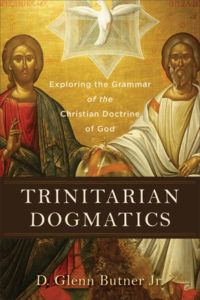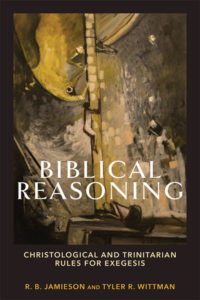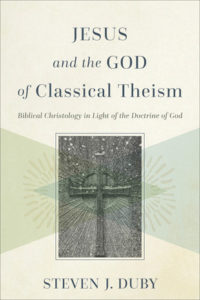
Author’s Corner
Each week on Credo we welcome you to join us in the Author’s Corner where we will meet a set of authors whose recent books deserve your attention and might even help you grow in your knowledge of theology, history, philosophy, and the scriptures. We hope the Author’s Corner can keep you up-to-date on the most important books published today and where you can find them.
On today’s Author’s Corner we present you with a selection of recent works from Baker Academic.
T rinitarian Dogmatics: Exploring the Grammar of the Christian Doctrine of God by D. Glenn Butner Jr.
rinitarian Dogmatics: Exploring the Grammar of the Christian Doctrine of God by D. Glenn Butner Jr.
This introduction draws on the breadth of the Christian tradition to present a biblically grounded, globally informed, and conceptually precise account of the doctrine of the Trinity.
Trinitarian Dogmatics analyzes eight trinitarian doctrines, systematically exploring key themes and concepts that constitute trinitarian discourse. Offering an alternative to introductory texts on the Trinity that are arranged historically/chronologically, this book proceeds locus by locus, offering chapters dedicated to doctrines like divine simplicity, perichoresis, and the inseparable operations–doctrines that are fundamental to a robust understanding of the Trinity but are often treated only briefly in other survey works. Butner’s account of the Trinity is consciously orthodox in its aspirations, following historic creeds and confessions in defending doctrines like eternal generation and divine simplicity that have often fallen out of favor in much modern theology. Yet it is also ecumenically orthodox, intentionally drawing on Protestant, Catholic, and Orthodox traditions while referencing other groups falling beyond those categories.
Trinitarian Dogmatics incorporates majority world theology, engages important debates in contemporary biblical studies, and draws on neglected historical figures. It also contains a glossary of trinitarian terms and annotated bibliographies of major works on the doctrine of God, making it suitable for students in courses on the doctrine of God and the Trinity as well as scholars working in those areas.
B iblical Reasoning: Christological and Trinitarian Rules for Exegesis by R. B. Jamieson & Tyler R. Wittman
iblical Reasoning: Christological and Trinitarian Rules for Exegesis by R. B. Jamieson & Tyler R. Wittman
Biblical Reasoning shows how Christology and the doctrine of the Trinity are grounded in Scripture and how knowledge of these topics is critical for exegesis. It focuses on the continuity of Scripture’s judgments with later doctrinal formulations, promoting a mutually informative relation between exegesis and theology born from attention to Scripture’s primary acting subject: God revealed in Christ.
The authors explain that evangelical theology still maintains too sharp a divide between reading Scripture and formulating doctrine. A necessary means for overcoming this divide is attending to the grammar of Scripture’s speech about Christ and the Trinity. Biblical Reasoning outlines key theological principles and rules for the exegesis of Christian Scripture. The authors explore how the triune God revealed in Christ shapes Scripture and its readers and how doctrinal rules intrinsic to Scripture help guide exegesis. The goal of biblical reasoning is the goal of Scripture itself: to shape readers into disciples who pursue the vision of the triune God in Christ.
Biblical Reasoning helps readers understand that theology should be more exegetical than many theologians think, and that exegesis should be more theological than many exegetes allow. It enables students to integrate what they learn in their biblical studies and systematic theology classes, making it an ideal textbook for hermeneutics and interpretation courses.
J esus and the God of Classical Theism: Biblical Christology in Light of the Doctrine of God by Steven J. Duby
esus and the God of Classical Theism: Biblical Christology in Light of the Doctrine of God by Steven J. Duby
In both biblical studies and systematic theology, modern treatments of the person of Christ have cast doubt on whether earlier Christian descriptions of God–in which God is immutable, impassible, eternal, and simple–can fit together with the revelation of God in Christ. In addition, such treatments have called into question whether these concepts and categories still enable insight into the Bible’s portrayal of Christ’s life and work.
This book explains how the Jesus revealed in Scripture comports with earlier Christian descriptions of God. Steven Duby argues that the Bible’s Christology coheres with and even requires the affirmation of divine attributes like immutability, impassibility, eternity, and simplicity. Duby offers a constructive treatment of the person of Christ, illuminating his relationship to the Father and the Spirit, the unity of his person, and the genuineness of his human life and suffering.

